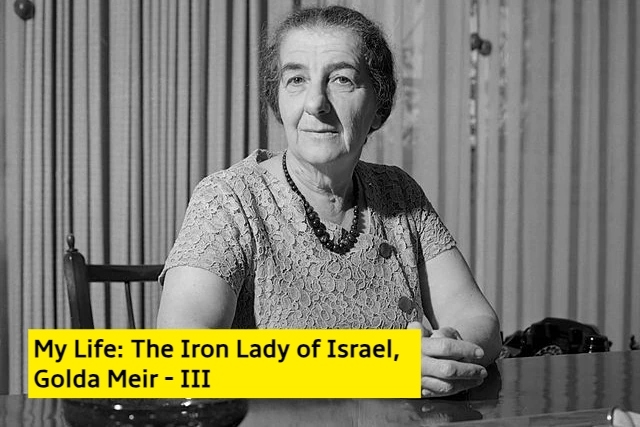My Life: The Iron Lady of Israel, Golda Meir - III
30 Oct 2023 20:42:19
For Golda, the new world of America had so much to offer, that almost all the memories of Pinsk were wiped out. For her, the new things that symbolized America had a taste of freedom. When she first saw her father marching on the occasion of labour day, she described it as ' coming out of the dark into the light '. Milwaukee was the city of migrants and her motto was to work very hard to support the family. Her sister Sheyna didn't like it much because she had to part with her fiance who was still in Russia then, he joined her after some time. He migrated to America and could get a job eventually. Initially, Sheyna couldn't adjust to the new world, with a new language and new people to make friends with.

They were good years for Golda, she wrote. She enjoyed her schooling years, though life was still in a very difficult phase, both of her parents were trying their best to earn well but couldn't succeed much. Golda earned lifelong friends and watched the first movie in the theatre. When she was in the fourth class, she was involved with her first public work. Though the education was almost free, students in her class couldn't manage to buy the textbooks. To solve the problem, she decided to raise funds, with her friend Regina she collected a small group from the school. They decided to organize a public meeting on the issue of textbooks, announcing the name of the group ' American Young sisters society'. Golda got herself appointed as the chairman, booked a hall ( the hall authority too believed in the girls at the age of 11 ), and sent invitations. A sizable amount by their standard was raised,even the local newspaper reported it with a picture of Golda. Golda's address was well delivered, she spoke about what she felt on the issue, in the later phase of her career too she never used written text except for the policy statements.
During the summer vacation, Golda along with Regina worked as junior sales girls in a store, they even saved money by walking to the store and used the money to buy a winter coat, the first buy using hard-earned money. After her elementary school education, she wanted to join high school, and the three girls used to discuss the future. Her father was not in a situation to help her continue her education, her mother expected her to work full-time and think of marriage seriously. She tried to convince them but couldn't succeed.
Her sister Sheyna and her fiance Shamai encouraged her, both decided to help her, they were in Denver then. ( They got married and it was the happiest marriage that lasted for more than 40 years, described Golda) She joined high school and did a variety of odd jobs to be independent financially. When her mother was thinking of an old man to get Golda married to, the advice from her sister was to join them in Denver immediately, in the touching letter Sheyna wrote that Golda had all opportunities to study, plenty to eat, and all the necessary clothes needed. The year was 1912, life was at a crucial juncture, real education began, and Golda sensed the opportunity. Sheyna's advice was, she had to be calm, brave, and act coolly without getting excited. This guided Golda when she came to her real home ( Palestine ), she was ready to fight to the death in order to stay afloat.
The only way to join them was simply to leave for Denver. She worked to collect sufficient money, borrowed some money, and planned meticulously. Golda scribbled a note at night with a heavy heart that she would live with Sheyna to be able to study, and she noted that they didn't have to worry. She was only 15 then,felt very guilty as leaving, but she thought that her younger sister Clara's life would be easier being the only child at home to be taken care of.
The next morning Golda left as decided, and boarded a train to Denver, she said she had ' more luck than brain '( a Yiddish saying, Yiddish was the language spoken at Golda's home ), and her parents didn't find the note till the train left. Her friend Regina and younger sister Clara wrote to her later describing the situation at home after she left. Obviously, Regina had her share of punishment, Clara accused her in her letters.
At Denver, Golda helped Shamai in his dry-cleaning shop, where she could complete her homework and cater to the customers. Life at Denver brought Golda closer to politics and taught her many important lessons in life, probably shaping her opinions as the city was a center of Jewish immigrants from Russia.